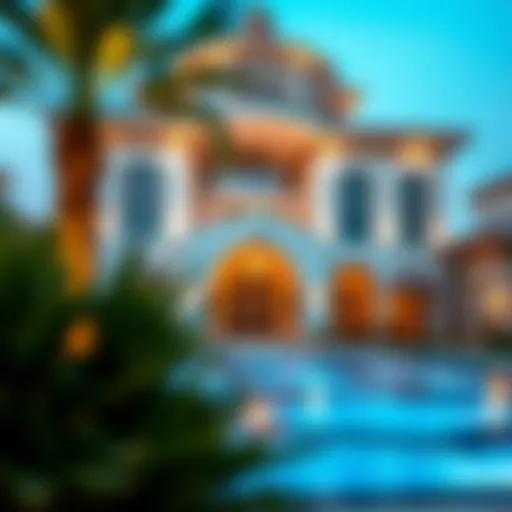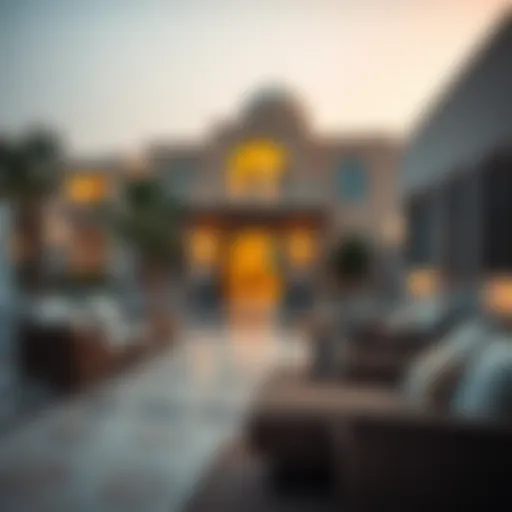Exploring Concept Seven in Dubai's Real Estate Market
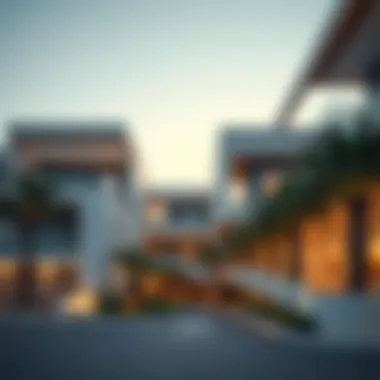

Intro
The real estate market in Dubai is akin to a lively bazaar, bustling with potential, innovation, and, above all, change. As the skyline continually morphs with new architectural marvels, investors and residents alike find themselves navigating an intricate web of opportunities shaped by evolving concepts. One such intriguing framework that has emerged is Concept Seven. This approach doesn't just skim the surface of real estate; it dives deeply into the heart of what makes living in Dubai distinct.
The aim here is simple: to provide a comprehensive compass for investors, homeowners, expatriates, agents, and analysts. We will unpack Concept Seven, explore its significance, and peel back the layers of its implications within Dubai's real estate sector. By the end of this exploration, you will have a clearer grasp of the strategic opportunities that abound in this dynamic market, spotlighting lifestyle, design, and keen investment strategies.
Market Trends and Analysis
Current Market Overview
Dubai's real estate market is not merely a reflection of buildings and vacancies; it's a living entity that mirrors broader social and economic trends. As of now, Dubai is seeing a strong uptick in demand for residential properties, especially in areas where lifestyle choices mingle with cutting-edge design.
- Urban planning is becoming more integral, with neighborhoods designed around community spaces, parks and schools.
- The focus on sustainability is not a fleeting trend but a crucial factor influencing buyer preferences.
- Modern amenities and improved public transport links add to the desirability of various locales, making them hotspots for investment.
The overall sentiment indicates a balanced approach toward property investment here, where potential buyers and tenants are now more informed and cautious. They are increasingly looking for properties that not only serve their housing needs but also integrate into a vibrant community of like-minded individuals.
Future Market Predictions
The future of Dubai's real estate market seems promising, with several trends pointing towards steady growth. Here are a few key prognostics:
- Continued focus on sustainability: More developers will likely embrace eco-friendly materials and designs, matching the global shift toward sustainable living.
- Integration of smart technology: Homes equipped with smart systems to streamline daily activities and enhance security
- Rise in demand for mixed-use developments: Properties that combine residential, retail, and leisure functions are expected to be particularly appealing.
"Understanding the direction of the market is paramount for both investors and residents; it's like reading a treasure map, with promising areas clearly marked."
Investment Opportunities
Emerging Neighborhoods
In the ever-evolving landscape of Dubai real estate, certain neighborhoods are beginning to take the spotlight. Areas that were once overlooked are now considered gold mines of investment potential:
- Jumeirah Village Circle (JVC): Offering affordable housing with good amenities, this locality is buzzing with expats and young families.
- Al Furjan: Mixing residential and commercial needs, this area promises a vibrant community feel.
- Dubai Hills Estate: Known for its luxury villas, this area is rapidly becoming a hub for high-end living, combining nature with modernity.
Investors should keep their ears to the ground, as these neighborhoods are gaining traction and may yield higher returns in the near future.
Types of Properties for Investment
Investing in Dubai is not one-size-fits-all; the market offers a diverse range of property types to consider:
- Luxury Villas: Draw in a clientele that is seeking opulence.
- Apartments: These come in various sizes and price brackets, appealing to singles, couples, and families.
- Commercial Spaces: A chance to invest in thriving businesses; perfect for those who want to diversify their portfolio.
For more in-depth analysis and resources, check out Britannica, Reddit, and Wikipedia.
Intro to Concept Seven
Concept Seven is emerging as a significant paradigm shift in Dubai's real estate realm, a framework that promises to reshape how we perceive not just the buildings, but the entire urban landscape. The significance of this concept cannot be overstated, as it addresses many of the current challenges while also aligning with the futuristic vision of the city. This section introduces the essence of Concept Seven, placing it firmly within the context of today's dynamic real estate environment.
Defining Concept Seven
At its core, Concept Seven represents a multifaceted approach to urban development that integrates sustainability, community engagement, and innovative design principles. It pivots away from traditional models, emphasizing the creation of spaces that not only serve functional needs but also cultivate a sense of belonging and connection among residents. This approach prioritizes a balanced interaction between residential needs and environmental sustainability, aiming to reduce the ecological footprint of new developments. Emphasizing aspects such as energy-efficient building methods, the creation of green spaces, and the use of renewable resources, Concept Seven encourages a mindset that sees homes and communities as interlinked endeavors.
Historical Context
To fully grasp the implications of Concept Seven, we must first consider the historical backdrop of Dubai's rapid urbanization and real estate boom. Over the past few decades, the city has transformed from a modest trading port into a metropolis teeming with luxury skyscrapers and sprawling urban developments.
Historically, Dubai's real estate strategies were often influenced by quick returns and eye-catching designs. However, as social and environmental challenges mounted, stakeholders began to recognize the need for a more holistic approach. The shift towards sustainable living and community-oriented design can be traced back to global trends advocating for eco-friendly practices. This has been fueled by a growing awareness of climate change and the impact of urban living on our planet.


In essence, Concept Seven can be seen as a response to the lessons learned from past developments, aiming to foster a sustainable future while accommodating the diverse expat communities and a burgeoning population.
"The evolution of Dubai's real estate is not just about construction; it's about crafting a narrative that values people, their lifestyles, and their environment."
As we embark on this exploration of Concept Seven, it is essential to highlight the intertwining of historical precedents and modern-day innovations, setting the stage for a comprehensive discussion about its core components, and eventual implications in the evolving landscape of Dubai's real estate.
The Real Estate Environment in Dubai
Dubai's real estate environment provides a critical lens through which to understand Concept Seven. It serves as the backdrop against which this innovative approach unfolds, allowing for a deeper appreciation of its relevance in today’s market. With its unique mix of luxury and modernity, Dubai has carved out a distinct niche within the global real estate cosmos. This section highlights core elements that shape this environment followed by the benefits it offers to various stakeholders.
Current market dynamics in Dubai are evolving rapidly. Investors, homeowners, expatriates, agents, and analysts are now navigating a landscape characterized by post-pandemic recovery and heightened buyer demand. Several trends are contributing to this vibrant environment:
- Increased demand for sustainable living options: More buyers are on the lookout for eco-friendly developments that align with their values. Sustainability isn't just a buzzword anymore; it's a substantial factor driving decisions, urging developers to embrace green technologies.
- Rising expatriate population: As individuals from around the globe flock to Dubai for work opportunities, the demand for housing continues to surge. Investors are keen on tapping into this rising market.
- Technological integration: Whether it's smart homes or blockchain in property transactions, tech is reshaping how real estate functions, making it crucial to adapt.
The regulatory framework governing Dubai’s real estate market also warrants attention. A robust and well-structured set of regulations underpins the safety, integrity, and transparency of the market. The Dubai Land Department is pivotal in this aspect, ensuring compliance and protecting the rights of buyers and sellers alike. Here are significant features of the regulatory landscape:
- Property Ownership Laws: Foreigners can fully own properties in designated areas, a boon for international investors looking for a slice of this lucrative market. This legislation invites significant foreign direct investment.
- Rental Regulations: The Rent Index, established by the Dubai Land Department, allows tenants and landlords to understand fair rental price benchmarks. This resource helps avoid disputes and enhances market stability.
- Real Estate Development Regulations: Stringent measures are in place to ensure that projects meet necessary quality and safety standards before they hit the market. These practices foster trust and accountability.
Many real estate analyses point out that understanding these elements can significantly assist potential investors in making informed decisions. As Dubai’s market continues to adapt to changing demographics, lifestyle preferences, and economic challenges, grasping these regulations and trends creates opportunities that are not only lucrative but sustainable as well.
"Navigating Dubai's real estate market requires an understanding of the local environment, and adherence to the regulations ensures both safety and opportunity."
Core Components of Concept Seven
Concept Seven, as it unfolds in Dubai’s dynamic real estate market, is more than just a buzzword. It embodies a holistic approach that seeks to blend sustainable living, architectural beauty, and vibrant community engagement. Investors, homeowners, and expatriates looking to navigate this landscape would do well to comprehend its core components, as they serve as the bedrock for a thriving residential ecosystem. Each of these components plays a crucial role in bridging modern needs with traditional values, creating spaces that are not just about housing but about living.
Sustainability Principles
Sustainability isn’t just a trend; it’s become an essential pillar of real estate development in Dubai. With the city’s rapid urban expansion, the emphasis on eco-friendly practices in real estate has gained momentum. Sustainable principles within Concept Seven mean prioritizing energy-efficient buildings, using renewable materials, and integrating green spaces into urban settings.
• Eco-Friendly Design: Construction often incorporates elements such as solar panels and rainwater harvesting systems. For instance, properties like The Sustainable City are exemplary, showcasing how sustainable technologies can be blended seamlessly into everyday living.
• Biodiversity Conservation: Incorporating biodiversity within urban settings often includes planting native species in community gardens and parks. This ensures that the new developments not only serve human needs but also participate in local ecosystem preservation.
"In a city known for its skyline, sustainable principles guide the construction of buildings that harmonize with the environment, rather than dominate it."
Design Aesthetics
Aesthetic appeal is crucial in attracting potential buyers and residents, emphasizing that beauty and functionality can coexist. The architectural style promoted by Concept Seven focuses on unique, contemporary designs that often blend traditional Emirati elements with modern finesse.
• Innovative Materials: Developers are now exploring new materials that are both durable and visually striking. Projects like One Za'abeel redefine high-rise design, showcasing that innovation need not sacrifice elegance.
• Cultural Resonance: Designs are often reflective of Dubai’s multicultural fabric. Homes take inspiration from several influences, allowing residents to feel rooted in a cultural tapestry while embracing modern comforts.
Community Integration
The essence of community integration is about fostering interconnectedness among residents. Concept Seven promotes the idea that neighborhoods should be social hubs, enhancing the quality of life for all.
• Public Spaces and Amenities: Thoughtfully designed public spaces encourage interaction. Playgrounds, parks, and communal gathering spaces like the ones found in Jumeirah Beach Residence are critical for fostering social networks and community spirit.
• Mixed-Use Developments: Integrating residential, commercial, and recreational venues leads to a vibrant, bustling atmosphere. This approach is evident in areas such as Dubai Marina, where the blend of living spaces with entertainment options adds life and convenience to daily routines.
As Dubai continues to grow and evolve, the core components of Concept Seven will play an integral role in shaping not only the skyline but also the lifestyle of its residents. Understanding these elements can provide invaluable insights and opportunities for those looking to invest in this promising market.
Investing in Concept Seven Developments
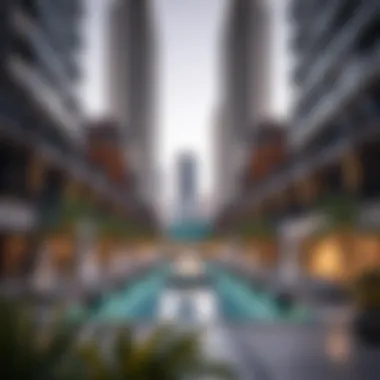

Investing in Concept Seven developments offers a unique opportunity for stakeholders in Dubai's real estate market. With the rapid changes and growing demand for innovative living solutions, this framework clearly encapsulates the essence of modern urban planning. Investors can benefit greatly by aligning their portfolios with the principles underlying this concept. The focus on sustainability, community integration, and cutting-edge design provide significant advantages for both developers and homeowners.
Potential Investment Opportunities
The variety of potential investment opportunities within Concept Seven is noteworthy. Here are a few areas to consider:
- Sustainable Projects: Investors can tap into projects focused on green building technologies. Buildings that utilize renewable resources or aim for energy efficiency are increasingly attractive to eco-conscious buyers. Featuring homes that use solar panels or rainwater harvesting systems is becoming more common.
- Mixed-use Developments: Expect to see more developments that blend residential, commercial, and recreational spaces. These mixed-use communities not only foster vibrant living environments but also enhance property values. With facilities for shopping, dining, and leisure just a stone's throw away, the appeal of such investments is clear.
- Luxury Condominiums: Fine living is part of Dubai’s DNA. Investing in high-end properties, especially those with views of iconic landmarks like the Burj Khalifa, offers the promise of high returns. Exclusive amenities such as private pools and fitness centers amplify this appeal further.
- Smart Home Technologies: Properties equipped with smart technologies are on the rise. From automated climate control to advanced security systems, homes that cater to tech-savvy residents can significantly increase their marketability and value in the long run.
Opportunities abound, but potential investors must keep their eyes peeled for the right projects that resonate with their specific goals.
Risk Assessment
While the allure of investing in Concept Seven developments is evident, it's crucial to consider the associated risks. A well-thought-out risk assessment will enable investors to approach their ventures thoughtfully.
- Market Volatility: The UAE's real estate market has experienced fluctuations in the past. Investors should be prepared for potential downturns in the market cycle. Staying informed about economic trends and demand levels is vital to hedge against such risks.
- Regulatory Changes: The Dubai government frequently updates regulations surrounding real estate. An investor's lack of understanding of these changes might lead to complications in property transactions, so staying abreast of local laws is advisable.
- Construction Challenges: Delays in project completions can impact investment returns. Issues can arise due to labor shortages or supply chain disruptions.
- Community Reception: Not all developments will be hailed by their intended market. Understanding local demographics and their preferences is imperative to ensure community integration and acceptance.
"Investment without thorough assessment is like jumping into a pool without checking the depth."
Investing wisely necessitates balancing the allure of potential returns with a prudent understanding of the risks involved. By doing so, investors can position themselves to reap the rewards that Concept Seven developments promise.
Impact of Lifestyle Choices
Real estate decisions in Dubai are heavily influenced by lifestyle choices. Understanding this impact is crucial for investors, homeowners, and expatriates alike, as it shapes not only how properties are developed but also how they are marketed and sold. A keen awareness of lifestyle dynamics can drive strategic investments and open doors to opportunities that go beyond mere transactions.
Lifestyle-driven Real Estate Decisions
Today, people are opting for properties that not only meet their basic needs but also align with their lifestyle aspirations. This trend underscores the necessity for developers to tap into the preferences of potential residents. For instance, individuals and families looking for homes may prioritize a sense of community, green spaces, and proximity to recreational facilities
Some important factors that influence lifestyle-driven real estate decisions include:
- Community Engagement: Buyers often look for neighborhoods with a vibrant social atmosphere, where they can forge connections and participate in communal activities.
- Access to Amenities: Properties located near cafes, gyms, shopping centers, and schools tend to be more desirable. Proximity to transportation hubs may also be a significant consideration.
- Work-Life Balance: Many individuals today are seeking more than just a roof over their heads. Homes that offer flexibility for remote working, or even live-work spaces, are gaining traction.
Exemplifying this shift, developments in areas like Dubai Marina and Jumeirah Beach Residence attract those who value a posh lifestyle with abundant leisure options nearby. The integration of lifestyle-centric features into property design is not just an afterthought but a core philosophy of Concept Seven.
The Role of Expatriate Demographics
Dubai's real estate landscape is further complicated by its diverse expatriate population. Expatriates not only make up a significant portion of the city's residents, but their unique preferences also impact the types of properties in demand. Most expats are drawn to areas that reflect their home country cultures while also offering a cosmopolitan lifestyle.
Noteworthy aspects to consider include:
- Cultural Fusion: Many expatriates seek neighborhoods that allow for cultural expression and community gatherings. Properties located in areas with shops or amenities that cater to various cultures are often in higher demand.
- Security and Safety: Expats often prioritize personal and family safety. Developments that offer enhanced security measures are more attractive.
- Financial Considerations: The financial ability to purchase property also plays a vital role. Expatriates may look for affordable housing options, yet they often prefer premium features that offer good value for money.
The intersection of lifestyle choices and expatriate demographics is reshaping real estate in Dubai. Investors who are aware of these dynamics can better tailor their offerings to meet evolving demand.
Comparative Analysis
Understanding the nuances of Concept Seven demands a thorough comparative analysis, particularly as it stands against traditional approaches in real estate. This comparison not only highlights the unique attributes of Concept Seven but also underscores its relevance in the context of Dubai’s dynamic market. Key elements such as adaptability, sustainability, and community integration merit discussion to outline how Concept Seven diverges from conventional methods.
Concept Seven vs. Traditional Approaches
When analyzing Concept Seven, one must consider its distinctive principles that reshape the conventional paradigms in real estate development. Traditional approaches often emphasize maximization of space and short-term financial returns. In contrast, Concept Seven prioritizes long-term sustainability and community-centric design. Residential projects under this model are not mere structures but ecosystems designed to foster interactions among residents, thereby enhancing their quality of life.
This approach encourages developers to approach projects with an eye toward future impacts on both the environment and local society. For instance, while a traditional high-rise might merely focus on the number of units it can rent out, a Concept Seven development might incorporate green spaces, leisure facilities, and even integrated services like co-working spaces, thereby responding to a broader spectrum of buyer needs.
Some important features of Concept Seven compared to traditional models include:
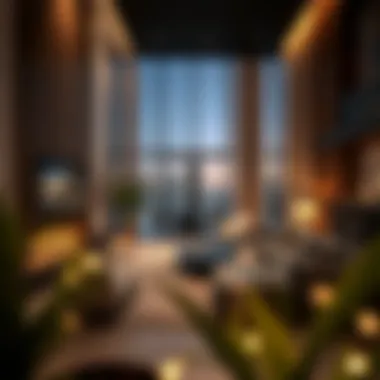

- Sustainability Focus: Green building practices and energy-efficient designs are standard, unlike traditional construction methods that may prioritize cost reduction over environmental impact.
- Community Engagement: Rather than isolating units, the design fosters social interaction, ensuring that spaces are conducive to community gatherings.
- Investors’ Perspective: The long-term vision associated with Concept Seven can attract investors looking for enduring value rather than quick flips, enhancing stability in a volatile market.
Given these considerations, it’s apparent that the paradigm shift represented by Concept Seven aligns itself with contemporary demands found within global real estate trends.
Global Perspectives on Similar Models
The global landscape presents various interpretations of modern sustainable housing models akin to Concept Seven. Cities worldwide are gravitating toward practices that merge community needs with environmental consciousness. Noteworthy examples can be drawn from initiatives in cities like Copenhagen, known for its integration of bicycle-friendly infrastructure and communal living spaces, which echoes the ethos of Concept Seven.
In Asia, Singapore's vision of vertical gardens and integrated public spaces showcases another model that prioritizes livability. These cities demonstrate that the shift away from traditional real estate development isn't just a trend but a rising standard, indicating a global acknowledgment of the need for balance between urban development and personal well-being.
Here are several aspects reflecting global trends relevant to Concept Seven:
- Innovative Building Technologies: Integrating smart home systems is becoming increasingly prevalent, providing residents with control over their environment.
- Mixed-Use Developments: Similar to Concept Seven, global cities are increasingly adopting mixed-use planning that blurs the lines between residential, commercial, and recreational spaces.
- Cultural Adaptation: Understanding local customs and integrating them into the design and purpose of developments can enhance acceptance and satisfaction among inhabitants.
As cities around the world evolve, the expectation for holistic and sustainable urban environments continues to grow. Concept Seven appears to be at the forefront of this shift, promising a way forward that aligns sustainability with community well-being.
In a rapidly changing environment like Dubai’s, where the pressures of urbanization and a quest for modern living converge, Concept Seven embodies a relevant model. The choice before stakeholders is clear: embrace innovative frameworks like Concept Seven or risk falling behind in a competitive and evolving market.
Future of Concept Seven in Dubai
The landscape of real estate in Dubai is ever-evolving, influenced by a myriad of factors ranging from economic trends to shifting lifestyle preferences. Concept Seven, as an emerging framework, stands poised to play a pivotal role in shaping the future of this sector. The discussion around its future is deeply intertwined with the innovative approaches it brings to sustainability, community living, and investment strategies.
As the city continues to grow, understanding the future implications of Concept Seven can provide insights into potential developments that align with both investor goals and resident lifestyles. This makes it essential for stakeholders—from expatriates seeking housing to investors looking for promising opportunities—to grasp the nuances that will define this framework.
Projected Developments
Looking ahead, the projected developments under Concept Seven are undeniably promising. Key aspects include:
- Sustainable Infrastructure: There’s a strong push towards green buildings and eco-friendly designs. Developers are actively incorporating solar panels, rainwater harvesting systems, and energy-efficient appliances into their projects.
- Smart Technologies: The integration of IoT (Internet of Things) is becoming a cornerstone of new properties. Smart home technologies that enhance security, energy management, and comfort are on the rise. This trend appeals particularly to tech-savvy expatriates and younger home buyers.
- Mixed-use Spaces: Upcoming developments are likely to emphasize mixed-use environments that include residential, commercial, and recreational spaces. These developments cater to the growing demand for convenience and accessibility, creating a livelier community atmosphere.
"Concept Seven encourages the creation of environments where living, working, and leisure seamlessly blend."
With such foresight in design and function, investors may find substantial opportunities, since properties adhering to these principles tend to attract a higher caliber of tenants and buyers alike.
Evolution of Market Expectation
As we consider the evolution of market expectation, it's crucial to recognize how consumer preferences are shifting in Dubai's diverse population. The buyer now is more informed and values unique features that enhance quality of life. Key points of evolution include:
- Demands for Affordability: A noticeable call for reasonably priced housing without compromising quality. Investors that can address this demand through Concept Seven initiatives are likely to find considerable success.
- Focus on Lifestyle: More than ever, buyers prioritize lifestyle over mere location. Factors such as community culture, proximity to parks, recreational facilities, and wellness options are essential.
- Embracing Diversity: As the expatriate community grows, there is increased demand for culturally sensitive developments that accommodate various backgrounds. Builders recognizing this trend may gain a competitive edge in a saturated market.
In summary, the future of Concept Seven in Dubai's real estate landscape is firmly linked to the city's ability to adapt to emerging demands while maintaining a focus on sustainability, technology, and community. Investors and homebuyers alike should be keen to stay informed of these trends, ensuring they seize opportunities that will arise as the market evolves.
Ending
The conclusion serves as a vital element in this exploration of Concept Seven’s impact on Dubai’s real estate landscape. It stitches together the insights garnered throughout the article, offering a holistic view of how this framework aligns with the city’s evolving housing demands.
Summary of Insights
One of the key findings is how sustainability principles in Concept Seven are not just buzzwords; they drive the design and construction of new developments. There is a pressing need for efficiency in resource use, aligning with both global trends and local expectations. Moreover, it’s clear that design aesthetics play a pivotal role. Developers are now creating spaces that not only serve a practical function but also spark joy and community interaction. Furthermore, the integration of community-focused amenities allows for a greater sense of belonging among residents, bridging gaps between various demographic groups.
In terms of investment potential, the clear demand for properties influenced by lifestyle choices suggests bright prospects for those looking to invest in this area. Understanding demographic trends among expatriates reveals further layers of strategic planning that investors need to consider. This is more than just about numbers; it’s about creating environments where people want to live, work, and thrive.
Final Thoughts
In wrapping up, it is important to consider the ever-changing dynamics of Dubai’s housing market. As the city continues to grow and evolve, those who grasp the essence of Concept Seven will undoubtedly find themselves at an advantage. The interplay of lifestyle, sustainability, and community integration is not merely a passing trend; it is a blueprint for future developments. Thus, investors, homeowners, and agents alike must remain vigilant and adaptable, harnessing the lessons learned from this unique approach.
In sum, engaging with Concept Seven isn't just a real estate strategy—it’s an invitation to participate in a transformational narrative that defines modern living in Dubai.
"Adopting a forward-thinking approach is the key to unlocking potential in today’s real estate market."
For further readings, you can explore resources such as Dubai Land Department, Expat Life in Dubai, or insightful articles on Britannica.



